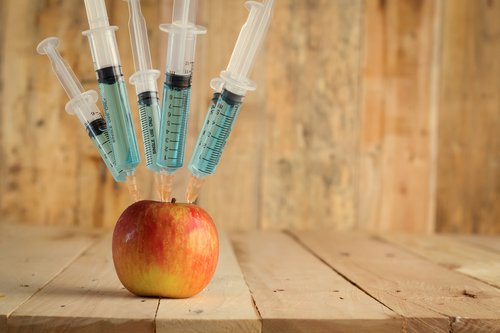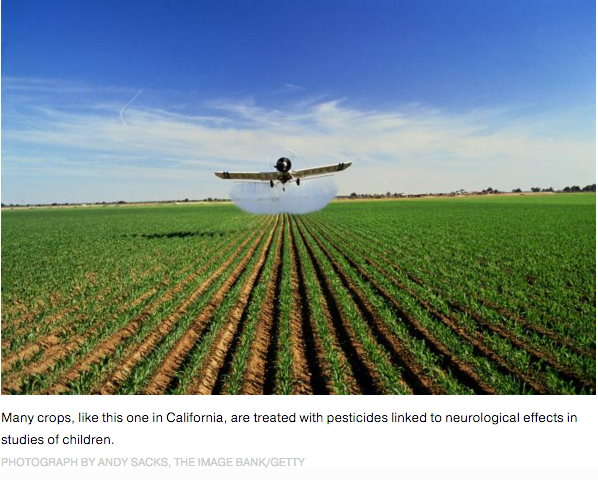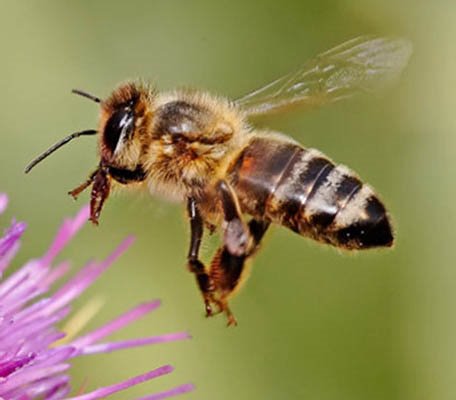2016 Postmortem
Related: About this forumHillary vs. Bernie on Frankenfood
Why would voters choose Bernie Sanders over Hillary Clinton?Food is a good reason for Democrats and Republicans to abscond from their "politics as usual" party loyalties and vote for Bernie Sanders, the 38-year Independent running against Hillary Clinton for the Democratic primary. This article deals with both candidates' positions on two issues that relate to the food we eat - GMOs and the Trans Pacific Partnership.
Hillary Snip:
How is Hillary personally involved in supporting big agriculture? The Clinton Global Initiative (CGI), which gathers leaders to solve the world's problems, promotes Monsanto, the maker of RoundUp® and RoundUp Ready® seeds. Hugh Grant, Monsanto's Chairman and CEO spoke at the Clinton Global Initiative conference in September, 2014. Ms. Clinton's top campaign advisor, Jerry Crawford, was a lobbyist for Monsanto for years and is now the political pro for her Super PAC, "Ready for Hillary." Clinton spoke in favor of the government's Feed the Future (FtF) program, a USAID funded, corporate-partnered program that brings RoundUp Ready® technology to the most vulnerable populations of the world. Monsanto and Dow Chemical support Hillary and Bill's 'Clinton Foundation' with generous donations.
Bernie Snip:
Senator Bernie Sanders represents Vermont, the first state in the nation to pass a "right to know" GMO labeling law. He authored an amendment to the 2013 farm bill that would have given states the ability to require labeling so that they don't have to fight for it, state by state, through propositions on the ballot. Sanders' amendment was defeated 71 to 27 in the Senate, even though 93 percent of Americans want GMOs labeled.
"An overwhelming majority of Americans favor GMO labeling but virtually all of the major biotech and food corporations in the country oppose it." says Sanders. Vermont's labeling law is scheduled to go into effect on July 1, 2016. "The people of Vermont and the people of America have a right to know what's in the food that they eat," Sanders said.
Read the Article:
http://www.huffingtonpost.com/judy-frankel/hillary-vs-bernie-on-fran_b_7638846.html
---
Personal message:
It took until 1800 for our population to reach 1 billion. By 1960, we were at 3 billion. Today we are at 6 billion and in the next 50 years, we will reach close to 10 billion people on our planet. Our children are growing up in a different world.
Sustainable agriculture is important to our survival. Big Ag is not the answer. Allowing GMO's that many times require more pesticide and have been modified to fight nature in ways we do not fully understand is not a good idea. Introducing GMO food without testing for safety is also a bad idea. Good or bad, who can argue for testing by independent labs versus testing on the population as they do today?
Local and chemical free is the answer.
Here are a few articles to support my position.
The GMO Issue: False Claims, Pseudo Analysis And A Politically Motivated Agenda

http://www.counterpunch.org/2015/12/25/the-gmo-issue-false-claims-psuedo-analysis-and-a-politically-motivated-agenda/
---
A Secret History of the Monarch: How the Biotech Industry Conspired to Knock Off One of the World’s Rarest Butterflies

http://www.counterpunch.org/2015/12/31/a-secret-history-of-the-monarch-how-the-biotech-industry-conspired-to-knock-off-one-of-the-worlds-rarest-butterflies/
---
Do you agree with the USDA that pesticide residues in food are safe?

http://articles.mercola.com/sites/articles/archive/2015/01/27/glyphosate-gmo-pesticide-residue.aspx?x_cid=20151212_tweet_glyphosate-gmo-pesticide-residue_twitterdoc
---
National Geographic: Roundup is an Endocrine Disruptor & Costs BILLIONS

http://news.nationalgeographic.com/news/2015/03/150305-chemicals-endocrine-disruptors-diabetes-toxic-environment-ngfood/
---
Hungry for land: Small farmers feed world with less than quarter of all farmland

https://www.grain.org/article/entries/4929-hungry-for-land-small-farmers-feed-the-world-with-less-than-a-quarter-of-all-farmland
---
Vandana Shiva: Industrial agriculture causes hunger

http://climateandcapitalism.com/2012/08/28/vandana-shiva-industrial-agriculture-causes-hunger/
---
Dirty Money, Dirty Science

http://foodtank.com/news/2015/09/corruption-of-academic-crop-science-by-the-biotech-industry-reaches-far
---
djean111
(14,255 posts)to do so.
Thank you for this great OP! Glad to be one of the first to rec it, and before the Monsanto folks attack, too!
Yeah, waiting for the attack with a large pot of coffee.
Divernan
(15,480 posts)Great OP. Thanks.
peacebird
(14,195 posts)Let consumers decide.
Scuba
(53,475 posts)nolabels
(13,133 posts)Really though it doesn't take much to be one of those people. Just a dose of self-righteous ignorance and little sprinkle of vindictiveness then magically a bigot will appear that feels opinion is much more important than numbers, results, facts and even peoples lives and deaths. They are kind of like garden weeds, they pop up in multitudes and try to choke out all things being cultured. They have no reason to why they are, but do know what mission they are on.
Knowledge itself, is their kryptonite and having the knowledge at your fingertips makes them weaker at every turn
![]()
tecelote
(5,155 posts)You want GMO food to skip serious and long term tests yet you also want long term patents that push out small farmers.
We want safe and sustainable food.
90% of Americans want the labels.
Why are you opposed to a democratic choice?
nolabels
(13,133 posts)My handle is the same one i have had for fourteen or so years and had nothing to do with food when i took it. My original thinking was there was too much self-promotion on this site and it was a turn off to some (including me). So nolabels indicates not wanting self-promotion but only wanting to put in my two-cents of what i know or feel is correct.
Pretty sure i did not indicate or endorse any of those things you accuse me off, but would more than willing to listen ![]()
tecelote
(5,155 posts)Rereading your post I realize it now.
cab67
(3,666 posts)I do, however, question the information used to bolster it. And a couple of facts need to be borne in mind:
1. All crops are GMO. Every one of them. They may not be transgenic (which is what most people opposed to GMO foods are actually worried about; hence the nonsense term "frankenfood"![]() , but there is literally no such thing as a crop plant or domesticated animal that is not, in some way, genetically modified.
, but there is literally no such thing as a crop plant or domesticated animal that is not, in some way, genetically modified.
2. No one has ever demonstrated health risks to humans from GMO foods. Based on everything we can determine scientifically, they're perfectly safe to eat.
I would rather see the efforts directed less on the GMO crops and more on the horrific overuse of pesticides, herbicides, and antibiotics in the farming industry. That's where you'll find the real danger to human health and the ecosystem.
That, and the often disgusting business practices followed by big ag companies.
tecelote
(5,155 posts)GMO may be safe to eat but it does not make it good for the planet.
If you look at the articles, most of them deal with pesticide and herbicide use along with the business practices that are monopolizing the farming industry.
Here's another article showing the vast influence of companies that should be held to task for their huge monopoly in ag and their awful business practices.
Ukraine Agreed to a Monsanto “Land Grab” to Get a $17 Billion Loan from the International Monetary Fund (IMF)
http://www.globalresearch.ca/ukraine-agreed-to-a-monsanto-land-grab-to-get-a-17-billion-loan-from-the-international-monetary-fund-imf/5424058
I do believe that, if 90% of Americans want labels, then they should be added and the education can begin. The argument about the huge costs to label is nonsense considering food companies change their labels almost monthly as it is.
PyaarRevolution
(814 posts)You KNOW what we mean when we say genetically engineered and it's NOT Mendelian genetic engineering with the buffer of nature but genetic engineering done in a lab. But nice job trying to muddy the usage by playing semantics.
For number two, most of the studies they've done have been on animals regarding GMO's and the ones that aren't funded by Monsanto and others show at BEST neutral results, but they have seen some definite negative results. Bottom line I want labels on whether a product has GMO's in it and it fits with the idea of a free market as a market is free to work as it should so long as a consumer is given the chance to be informed. As part of the labeling they should put a regulation on the GMO growers that they can grow them but 2.7 miles around the growth area they must keep fallow as pollen can spread that far by wind. You want to grow GMO's and I want to be protected from being accidentally ingesting due to a crop contamination.
By the way, if you're interested in NOT having more pesticide sprayed on crops you should be against GMO's. Usually with the Roundup ready crops they spray even MORE herbicides on the crop because the crop can withstand it.
This just makes me want Hillary people to support Bernie even more. If you're a Hillary supporter but believe in the right to know whats in your food, to not have to worry about what your kids are eating, even when you think you're eating healthy, then support Bernie please or at the very least confront Hillary about this. I mean TPP will put us even more in danger of losing the food regulations we have. We already lost the "Country Of Origin" labeling on beef because, god forbid, Americans want to support their own industry in terms of beef and trust the product more. But the WTO says no because knowledge stymies their form of "competition".
cab67
(3,666 posts)your concern appears to be not with GMO, but with transgenic foods. And the real evil is the agricultural chemicals applied to crops, not the transgenic foods themselves.
Please use the terms correctly.
Response to Scuba (Reply #4)
Segami This message was self-deleted by its author.
Segami
(14,923 posts)
CharlotteVale
(2,717 posts)A Simple Game
(9,214 posts)then why aren't they embracing and demanding their "GMO" label being prominently displayed on the labels?
Perhaps they don't realize people believe entities operate in the shadows for nefarious reasons and don't trust things that wish to remain in the shadows?
tecelote
(5,155 posts)If they are a superfood, then market them that way.
They have the money to spend on marketing - they have a worldwide monopoly.
cab67
(3,666 posts)...is that every edible item in the grocery store would have to be labelled "GMO."
Chef Eric
(1,024 posts)cab67
(3,666 posts)If everything is labelled as GMO (which would be necessary, as everything we eat is GMO), the effort becomes a waste of time.
A better idea would be to label fresh vegetables and fruits with whatever herbicides and pesticides were used on them.
tecelote
(5,155 posts)"...label fresh vegetables and fruits with whatever herbicides and pesticides were used on them"
And, include the trace amounts so we truly can choose the most healthy food.
Chef Eric
(1,024 posts)Last edited Sun Jan 10, 2016, 10:47 AM - Edit history (1)
Which is why we see this label on some foods:
[URL= .html][IMG]
.html][IMG] [/IMG][/URL]
[/IMG][/URL]
The label is given to any food that is produced according to consensus-based best practices for GMO avoidance. It is not a guarantee that food is GMO-free, but it's about as close as one could hope for.
Therefore, there is no good reason why GMO food manufacturers should not be required to label their products as GMO. These labels would not be a "waste of time" any more than ingredient lists are a "waste of time."
Your idea about labels for fruits and vegetables is a good one. There is no reason why both ideas could not be implemented. The GMO label would apply to grocery items and the pesticide label would apply to produce.
cab67
(3,666 posts)Too many people confuse "GMO" (which includes every domesticated plant and animal alive today) and "transgenic." I have a GMO cat sitting on me as I type this, but I don't think she's transgenic.
Whether food can be classified as transgenic turns out to be a complex issue - about the only foods we can be assured are transgenic (or non-transgenic) are fresh meat, fresh vegetables, and fresh fruit known to come from very specific sources. And like I said, they're going to be GMO whether they're transgenic or not.
So yes, labelling foods as GMO would indeed be pointless.
Chef Eric
(1,024 posts)Labels ought to go on foods that are genetically ENGINEERED, or foods that have genetically ENGINEERED ingredients.
People have a right to know what they are putting in their bodies.
cab67
(3,666 posts)The products of artificial selection are genetically engineered - their genes (or allele frequencies) have been modified through selective breeding. So this, too, would be uninformative to consumers. Where you see splitting of hairs, I see an effort at being precise - these terms have very specific meanings in scientific circles, and it doesn't help to have terms mean different things to different people.
In nearly all cases, what people are worried about is transgenic foods made from crops in which genes have been spliced from another organism. (Which, in a very real way, is not very different from creating a hybrid, something farmers have been doing for millennia.) If we're going to require labelling of transgenic foods, fine - but we should also be very specific about the nature of what's been added to the crop's genome. Is it for herbicide resistance? That, to me, is a bad thing - it encourages the overuse of herbicides that can cause real harm to the ecosystem. Is it to boost levels of a vitamin? This would be a good thing.
This is why a blanket effort to label something as "GMO" or "transgenic" is a bad idea, unless we also add information on why the transgenic crop was created and what the added genes actually do. And it's why I think it's a far better idea to identify agricultural chemicals that might have been used on the crops - these are what do the real ecological damage, not the foods themselves.
PyaarRevolution
(814 posts)"In nearly all cases, what people are worried about is transgenic foods made from crops in which genes have been spliced from another organism. (Which, in a very real way, is not very different from creating a hybrid, something farmers have been doing for millennia.) If we're going to require labelling of transgenic foods, fine - but we should also be very specific about the nature of what's been added to the crop's genome. Is it for herbicide resistance? That, to me, is a bad thing - it encourages the overuse of herbicides that can cause real harm to the ecosystem. Is it to boost levels of a vitamin? This would be a good thing.
This is why a blanket effort to label something as "GMO" or "transgenic" is a bad idea, unless we also add information on why the transgenic crop was created and what the added genes actually do. And it's why I think it's a far better idea to identify agricultural chemicals that might have been used on the crops - these are what do the real ecological damage, not the foods themselves."
First bolded statement...I would argue it IS different when some have been splicing in animal genes to ANY plant. Additionally when you have apples and potatoes engineered to not brown you are changing the makeup of that produce.
Next, they WON'T be specific and clear about what's been added or if they actually are they won't let real tests be run on them. For your vitamin boost bit it sounds good but lets be blunt that this is a fault of food deserts and accessibility, as well as likely expanding SNAP benefits(I don't know how far food stamps go in getting access to fresh, organic produce at Farmers Markets and grocery stores). In terms of impoverished countries it's unnecessary for two reasons...1.A lot of places that would need those vitamins can grow Moringa as well which will nicely cover most of those nutrition gaps. 2.It may be cheap/free now for those countries to grow said crops but in the future those companies will make them pay a royalty. A lot of this GMO crop racket is to make the average person PAY a big multinational company like Monsanto EVERY time you grow a crop.
Lastly look at how some of the anti-Herbicide crops act on people's bodies and you might be singing a different tune in the last statement. Oh and I forgot to tell you about those GMO-Eucalyptus trees(or it might be another variety but I'm fairly sure I'm right) that are easy to pulp they're trying out. Those aren't anti-Herbicide but because they pulp easier I would argue it stands to reason that the trees themselves are structurally weaker. Imagine those trees contaminating other ones with that trait now lets extend that to Hurricane or Tornado season. It's going to take less effort to snap that tree which will result in possible tremendous damage unless you plant it FAR away from a house(psst everyone here know most homebuilders don't do that).
cab67
(3,666 posts)We'll have to agree to disagree here.
Next, they WON'T be specific and clear about what's been added or if they actually are they won't let real tests be run on them.
If they can't be specific, they shouldn't be labelled. Simple as that. As I've said repeatedly, calling something "GMO" tells us nothing.
For your vitamin boost bit it sounds good but lets be blunt that this is a fault of food deserts and accessibility, as well as likely expanding SNAP benefits(I don't know how far food stamps go in getting access to fresh, organic produce at Farmers Markets and grocery stores). In terms of impoverished countries it's unnecessary for two reasons...1.A lot of places that would need those vitamins can grow Moringa as well which will nicely cover most of those nutrition gaps. 2.It may be cheap/free now for those countries to grow said crops but in the future those companies will make them pay a royalty. A lot of this GMO crop racket is to make the average person PAY a big multinational company like Monsanto EVERY time you grow a crop.
I've been to places where transgenic crops have saved lives. I've been to areas of East Africa where transgenic crops allow food to be grown without completely draining the local aquifer, for example.
I agree completely with you on the issue of royalties, though. No matter how much we disagree on whether transgenic crops are inherently bad, I am no fan of how the big ag companies work.
cab67
(3,666 posts)If we insist on labelling transgenic foods, why not indicate the genes involved and their purpose? Were they intended to render a crop resistant to an herbicide, or to withstand drought? The former would (to me) be problematic, as I prefer not to consume substances intended to kill other organisms, but having been to some very arid and impoverished parts of the world, the latter would be an unambiguous good.
PyaarRevolution
(814 posts)Nature's Path and others which are Organic and you know what I mean so stop trying to muddy the term "Genetic Engineering" as you know what we're referring to.
cab67
(3,666 posts)I'm a scientist by training and profession, and I believe very strongly in using precise terminology when appropriate.
I'm not muddying anything. I'm trying to help others stop muddying things by misusing terms.
PyaarRevolution
(814 posts)is trying to get us use an ambiguous term for what Monsanto and others do to create crops like BT Corn, Cotton, Cassava, Sesame, etc. You want us to do this so as to hinder our ability to have said products containing these ingredients labeled, same with produce. Don't play otherwise, you've said yourself you're pro for their crops. I'm not falling for this ploy.
You and I both know that if we don't use GMO as the dog whistle which most people know and will stand up and pay attention, it makes it much harder for us and can possibly do an enormous amount of damage to the movement. We all know what using this word means now in common use.
addition: You can't tell me, in good conscience, that vegetables/fruit/plant products with animal genes inserted in them in a laboratory should be called by any of those names.
cab67
(3,666 posts)I'm trying to get us to stop using an ambiguous term. "GMO" refers to all sorts of things - hybridization, artificial selection, adding genes from one organism to another, duplicating genes in an organism, and so on. If you mean "transgenic," say "transgenic."
All kinds of problems arise when a word with a broad meaning is assumed to mean something more specific. Take, for example, the word "natural." All kinds of things are marketed as "all natural." Many of them have actually been highly modified and would not, to me, qualify as "all natural," but if an item only includes "natural" ingredients (however heavily changed they might have been during manufacture), it can get called "all natural."
Another (and more distantly related) example - the "zero tolerance" policies passed by many school districts in the 1990's and 2000's. These usually followed some sort of tragedy (an overdose, a stabbing, etc.) and were often passed in haste (which causes additional problems), but where the intent might have been to keep students safe from illegal drugs and from being stabbed or shot, they were worded so generally that first-graders bringing Swiss army knives to school (to show off the extra tools, not to use the blades) ended up getting expelled. That wasn't what the school districts meant, but the use of a generalized term where something more specific should have been used caused all sorts of lawsuits.
I really don't get why I'm being accused of muddying things when, in fact, I'm trying to get all of us to be more precise.
Orrex
(66,813 posts)Please provide a compelling reason why companies should be forced to make such a disclosure. An example of a compelling reason is the credible expectation that GMOs cause harm to people, to animals or to the environment. Your fear that GMOs might harm people, animals or the environment is not a compelling reason. Further:
Your wish that they disclose that information is not a compelling reason
Your raw fear of GMOs is not a compelling reason
Your suspicions about this or that company are not a compelling reason
Your belief that companies would have nothing to lose in doing so is not a compelling reason
The claims of NaturalNews, of celebrities, or of a handful of nutritionists are not a compelling reason
Also, the ever-popular slogan that "we have the right to know what we're feeding our children" is not a compelling reason, either. We do indeed have that right, and no one is forcing you to purchase foods that aren't labelled "GMO-free."
As always, I expect to see a parade of anti-GMO'ers accusing me of being a shill. That's ok, because I have plenty of room on my Ignore list.
A Simple Game
(9,214 posts)Apparently your wish to see warning labels removed from cigarette packs and safety ratings ended for cars is not a compelling reason for their removals. Obvious wastes of money and who cares anyway, right?
I'll add one for myself and my region of the world: I see no compelling reason for the EPA, I trust the mid west coal burning power companies completely when they say their emissions are not the reason all the fish died in the Adirondack lakes.
And apparently:
Your wish that a company take pride in their products or processes is not a compelling reason to brag about their products safety and benefit for society.
Your wish that companies spend monies on promoting their products benefits to society instead of spending monies to suppress the fact that they even have a product is not a compelling reason.
This is kind of fun, I could probably go on for hours, do you want to add anymore?
As for ignorance and fear? If companies would educate the public instead of spending money stonewalling them that would eliminate the perceived ignorance on the public's part and if there is nothing to fear then the education should eliminate that too.
By the way, I'm not anti GMO, I'm not anti many things at all, but I am for freedom of information. Oh, I just thought of another one, I'm anti Freedom of Information Act. What compelling reason would anyone have to want the government to be truthful?
Orrex
(66,813 posts)Your post is so ridiculous that I have trouble believing that you thought about any of it before you submitted it, and it's sad that you probably imagine that you were being clever. If you can formulate a serious response, I might be willing to address it.
Punkingal
(9,522 posts)alp227
(33,191 posts)It's hypocritical to condemn creationism, bigfoot sightings, and vaccine phobia while parading the GMO phobic junk science of Vandana Shiva and Bernie Sanders.
Amimnoch
(4,558 posts)Ferd Berfel
(3,687 posts)You'll be accused of being a Socialist and not a real Democrat
Great post BTW ![]()
SoLeftIAmRight
(4,883 posts)please america - don't fuck this up
Ilsa
(64,028 posts)She's older and worried about its impact on her major organs. Even she, a Carson supporter, understands Bernie's appeal on this topic alone.
drokhole
(1,230 posts)
http://ensia.com/voices/the-complex-nature-of-gmos-calls-for-a-new-conversation/
One of the most comprehensive I've come across, but added to it a bit of a lengthy response/addition:
Yes! It's stuff like this that the myopic/hyper-focus on GM overshadows and blocks out from the debate. Its become less about the problem (drought, yield, pest and disease-resistance, nutritional content, etc...), and almost exclusively about the wonders of GMOs. They can't tease apart the "wonders" (which are simply the idealized solution...which often times does still ignore the greater environmental context) from the GMO. Proponents forget, the purpose shouldn't be to cheer lead GMOs, it's about better addressing and resolving these issues - and they fail to question (or investigate) whether GMOs are the best way to achieve those results.
For example, they think they can simply splice in a gene to make a crop drought resistant, rather than, say, building porous soil rich in organic matter that increases rates of water absorption and leads to vastly larger stores of water retained (particular in times of low rainfall) - which itself often includes mixed stocking of crops and animals (among a host of other techniques). Or that pest resistance again comes down to adding another gene, rather than building the plants own existing defenses (again, through a robust soil teeming with biodiversity) and attracting and encouraging beneficial predators with a healthy and biodiverse landscape. It actually speaks largely to an all-too-common reductionist (not to mention "gene-centric"
Here, mycologist Paul Stamets describes one such relationship between a grass, mychorriza fungi, and a virus that allows the grass to grow and thrive in an environment with extreme temperatures (should be cued up around 23:42...if it isn't, skip ahead to that time):
Paul Stamets and John B. Wells - Mushrooms & Environment
?t=23m42s
You can't just genetically modify that into existence, you have to foster the relationship. It, in my opinion, is a much more advanced science/technique than the myopic "gene for every mean" approach. Which is why it's not only disingenuous, but exceedingly patronizing and insulting, for people like the NYT's Amy Harmon to throw around "anti-science" accusations and seedy equivocations. It not only falsely frames the terms of the debate (thus cementing positions and automatically granting one side an imagined intellectual high-ground), it ignores good science itself:
Organic agriculture: deeply rooted in science and ecology
Like farmer Joel Salatin says:
"Of course I think I’m using science, but so does Monsanto. And so the question is whose science will be used as a regulatory foundation and enforcement action? It won't be pasture-based livestock, compost and symbiosis through multispeciation. It will be further animal abuse, chemicals and pathogen-friendly protocols."
Further, problems like malnutrition (like Vitamin-A deficiency) involve a myriad of issues, including the physical (involving a broader lack of a complex of dietary fats and nutrients...which are actually required for proper absorption of Vitamin A) and the socio-politico-economical. GM-opia ignores the scope of the issues and smacks of simplistic solutionism.
Final thought, I'd even challenge the thought that "most" of the GMOs are safe to eat. Particularly those that exist in actual fact today. Reason being, almost no thought (and certainly hardly any study, particularly from the industry) has gone into considering the effects of these foods on our microbiome - those trillions of bacteria and other micro-organisms that live on and within our bodies (a large portion of which are in the gut), that are crucial in not only keeping us healthy but alive in the first place. One reason for this is we are only beginning to discover, realize, and appreciate just how crucial these critters are to health and well-being, with functions ranging from digesting and deriving nutrients in our food, to fighting off pathogens and regulating/boosting our immune-system. In fact, it is those very bugs in our guts we have to worry about when it comes to GMOs - not only when it comes to the chemical pesticides that the plants are engineered to withstand, but especially those "modified" with Bacillus thuringiensis (Bt) within the plant itself. Plenty of our "modern" disease epidemics seem to be rooted in inflammation stemming from gut/GI issues...and it could very well be that these "foods"/ingredients derived from them are contributing to that problem in large degree (and I seem to recall some preliminary findings hinting at such).
On a somewhat related (and equally fascinating) note, George Monbiot points out how - through a process dubbed "trophic cascade" - wolves can in fact change the course of rivers:
How Wolves Change Rivers
And, on a similar note, we see how "whales effect climate":
How Whales Change Climate
tecelote
(5,155 posts)Your point: "...we've lost sight of (or simply failed to identify in the first place) the mutualistic relationships of nature." That resonates.
My favorite quote from the article:
"What I object to is a lack of complex evaluations of the technology, the overzealous selling of its benefits and the framing of cautionary skeptics as anti-science scaremongers."
Your post is very insightful and it took me awhile to read and watch but I'm glad I did.
drokhole
(1,230 posts)Was just piggy-backing off your excellent post, and while I think it works best in concert/context with your own, went ahead and posted it in Good Reads (wasn't really sure where would be the best place):
THE COMPLEX NATURE OF GMOS CALLS FOR A NEW CONVERSATION
And thanks so much for taking the time to read the incredibly long-read (not to mention my epilogue of a response)! Not sure how many other people will have the time/patience to do so. I know that it took me awhile (with a few pauses/breaks) to read/digest it, but thought it was ultimately well-worth it.
PyaarRevolution
(814 posts)Has a LOT of money to lose in this fight so they'll bribe whoever they can to not look at these crops closely. Contrary to what people believe, most scientists are not filthy rich and can be bought off, especially their supervisors. The FDA is one case in point as they let Aspartame get approved despite some within' the agencies misgivings.
People should really look at most studies done on GMO's and see that most, if not all, of the positive one's are being funded by the companies in question.
JudyM
(29,669 posts)artislife
(9,497 posts)From honey bees

to Blind Melon's Bee girl
 ?w=728
?w=728
to the big B
Bernie Sanders!

